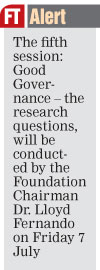Saturday Feb 14, 2026
Saturday Feb 14, 2026
Thursday, 6 July 2023 00:34 - - {{hitsCtrl.values.hits}}
By Sohan Fernando
|
Gamani Corea Foundation Chairman Dr. Lloyd Fernando
|
The Gamani Corea Foundation established by Dr. Gamani Corea himself is a non-profit charitable institution based on the wealth bequeathed by his family. Its mission is to contribute to the socio-economic development of Sri Lanka through multidisciplinary high-quality research and advocacy. In pursuit of this objective the Foundation decided to set up, the Sri Lanka Innovator’s Forum (SLIF) so that like-minded subject specialists could be brought together more effectively to discuss, debate and agree wherever possible on pressing issues affecting the country for effective, sustainable course correction.
The SLIF took stock on 24 February at the BMICH, under the patronage of the Prime Minister, supported by the Sri Lanka Economics Association, National Science Foundation, several Government institutions and private sector organisations.
Twenty thematic areas have been identified for research under the SLIF and each area is assigned to a subject specialist to write an ‘issues paper’, which will be discussed at length through round table sessions. Comments from subject specialists, where appropriate, are expected to be incorporated before final publication
The fifth session: Good Governance – the research questions, will be conducted by the Foundation Chairman, Dr. Lloyd Fernando on Friday, 7 July.
Dr. Lloyd Fernando’s monograph is a comprehensive exploration of the practice of good governance, offering valuable insights and a framework for evaluating Sri Lanka’s policies and performance. The monograph follows a well-structured sequence, starting with an examination of good governance within the broader context of development and contrasting different models of development—namely, the neo-liberal, socialist, and social market economy models. Dr. Fernando highlights the lack of clarity in Sri Lanka’s current development vision and emphasises the need for a defined framework.
The monograph delves into the fundamental aspects of good governance, beginning with the nine Cs of planning, which outline the managerial fundamentals necessary for effective governance. From there, Dr. Fernando introduces the seven principles of good governance, which form the basis for guiding the practice of good governance and the pursuit of a multi-dimensional development agenda. Throughout the analysis, Dr. Fernando employs visual diagrams to illustrate the interdependencies and components of good governance, culminating in a holistic framework known as the paradigm of development.
Central to Dr. Fernando’s argument is the importance of accountability as an institutional foundation for good governance within a democratic system. He further elaborates on the elements that uphold accountability and emphasises the significance of the seven principles of good governance in guiding governance practices and fostering a comprehensive development agenda.
In the conclusion of the monograph, Dr. Fernando raises several thought-provoking questions that require further inquiry and research. These questions shed light on critical impediments to development, including deficiencies in key institutions such as the judicature, the Cabinet, the planning framework, and the relationship between the political executive and the high-level bureaucracy. By addressing these questions and issues, policymakers and scholars have an opportunity to engage in a meaningful dialogue and contribute to the ongoing discourse on good governance in Sri Lanka.
Marga Institute Chairman Emeritus Dr. Godfrey Gunatilleke commends Dr. Fernando’s monograph as a valuable contribution to the discourse on good governance in Sri Lanka. He highlights its relevance for policymakers and scholars alike, providing an avenue to address the raised questions and issues. The monograph serves as a valuable resource for those seeking to navigate the complexities of governance and strive for effective and accountable governance practices in Sri Lanka.
 However, while the monograph provides a comprehensive analysis of good governance and its implications for development, it could benefit from further expansion. In order to fully explore the subject matter, additional research and empirical evidence could be incorporated to support the arguments presented by Dr. Fernando. Furthermore, a deeper exploration of case studies and best practices from other countries may enhance the applicability of the monograph’s recommendations to the Sri Lankan context.
However, while the monograph provides a comprehensive analysis of good governance and its implications for development, it could benefit from further expansion. In order to fully explore the subject matter, additional research and empirical evidence could be incorporated to support the arguments presented by Dr. Fernando. Furthermore, a deeper exploration of case studies and best practices from other countries may enhance the applicability of the monograph’s recommendations to the Sri Lankan context.
In conclusion, Dr. Lloyd Fernando’s monograph on good governance is an important contribution to the ongoing discourse in Sri Lanka. By presenting a well-defined sequence and framework of analysis, Dr. Fernando offers valuable insights into the components and principles of good governance. The monograph serves as a catalyst for further research and discussion, providing an opportunity for policymakers and scholars to address the critical issues and challenges facing Sri Lanka in its pursuit of effective governance and sustainable development.